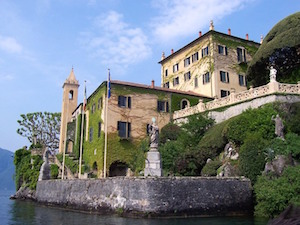LETTERS FROM THE GLOBAL PROVINCE
Let's Get Small, Global Province Letter, 9 November 2016
I'm on drugs. I'm, uh, I mean, you know what it is. What's the deal, man? I like to get small. It's a wild, wild drug. Very dangerous for kids though, because they get really small. I know I shouldn't get small when I'm drivin', but, uh, I was drivin' around the other day, you know [whistles tunefully] and a cop pulls me over. And he goes, 'Hey, are you small?' I said, 'No, I'm tall, I'm tall.' He said, 'Well, I'm gonna have to measure you.' They've got a little test they give you; it's a balloon, and if you can get inside of it, they know... you're small. And they can't put you in a regular cell either, because you walk right out.—Steve Martin
The Fastest Fat Man In Washington. We think of fat men as slow witted bumblers, as unpleasant, as flotsam and jetsam who plug up the body politic. Not so. John Shad comes to mind. Eccentric and smart as hell, he made a fortune in Wall Street and went on to do honorable service as the chairman of the Securities and Exchange Commission in Washington. My fast-tongued insider friends in Washington referred to him as the "fastest fat man in Washington." He and his wife Patricia were eccentric and very good company for an evening and were capable of a bit of impishness. He had a quixotic streak, having giving a boatload of money to Harvard Business School in 1987 (its largest gift up to that time) to back a big program on ethics. We say quixotic because ethics are not the stuff that turns the heads of Harvard MBAs, and Harvard itself is not a strong ethical force in its own community. But Shad was quite a guy, and we are surprised that the pundits and Harvard were not smart enough to accord him more recognition.

The King of the High C's. But the fat man we most miss is Luciano Pavarotti, son of a baker and a cigar factory worker. We listen to him along with his three tenor comrades most every day. He started poor in tough circumstance but he scaled every musical mountain. On a recent visit to La Scala for a performance of The Marriage of Figaro, we were enchanted but not captivated, because a snatch of opera anywhere only serves to remind us of Pavarotti, who was larger than the stage on which he performed. The performance of the Mozart opera moved the ears and the eyes, but not the heart. Fat men such as Pavarotti, on the other hand, can soar even if their sheer mass would like to implant their feet in clay.
But Italians Are Small. We had forgotten till our recent visit to Milan, Como, Torino, Bologna, and Parma that Italians, Pavarotti aside, are all about smallness. As you walk about this city or that, you suddenly become aware that the people are lithe but certainly not big. They are benign and blissful Lilliputians. It is easy to peer over them. Smallness we think is the secret of the Italian genius. Their micro focus makes them insert the telling detail, the particularity, that can turn something banal into greatness. It is perhaps the most creative nation on earth, producing a wealth of things terribly well designed.

As a memento of our trip, we have just added a host of Alessi artifacts to our household including a new electric teapot. At its best, Italy is a nation of wonderfully productive boutiques that shower beauty on the world. In the right hotel--we just stayed in one on a small side street, in what was a convent centuries ago--one can find tastefully, delicately painted walls, with decorative trim and interesting prints to match. At one espresso emporium, our cups had graceful tops, suggesting that we were uncovering something akin to nectar, making our sips an experience with grace.
At its worst it is a morass of confusion and failed institutions that simply don't work. Such is the Government. Its public debt, truly stupendous, has bulged to 130% of gross national product. We and President Obama have been charmed by Matteo Renzi, the premier of Italy who is taken to be America's best ally in Europe. But most of the Italians you bump into cannot stand him. The big things in Italy don't seem to work. Often the secret underground economy, out of sight, works better than the visible organs of commerce.
Italy came together as a nation very late. It has never knitted itself together. This is evident to a traveler from America who discovers that the Milanese do not know very well what is going on in Torino or Bologna, major towns only a short distance away. Foreigners who speak Italian learn that the Italian language really does not exist: it is a country of a 1000 languages: it is a confederation of a 1000 countries. Commentators have long noted the utter diversity of dialects:
"We all speak Italian with strong regional connotations, even if the discrepancies are minor," said Giovanni Ronco, vice director of the Italian Linguistic Atlas. "No other country has so many linguistic differences in such a limited space."
For centuries, Italy was a fragmented patchwork of thousands of small, insular communities. When the country unified in 1861, 90 percent of the population was illiterate and spoke only the local tongue. They are called Italian dialects, but many of these tongues are really separate languages, descended directly from Latin.
That helps account for the many names for familiar things, even within a single region. An anchovy is an "alice" in some parts of southern Italy, for example, but an "acciuga" in others. Neighboring dialects may be similar, but people from opposite ends of Italy—say, Sicily and Lombardy—might struggle to understand what the other said.
Looking for Beautiful Small Things. For the Italians, for the travelers, the lesson here is to look for the small great things off the beaten path. Our very generous hotel general manager Mauro Governato took us to a small, hidden, second floor tailor—a one man elegant business—so that we could uncover a distinctive bolt of cloth for our next suit which will be fashioned at our out-of-the-way suitmaker in New York City. The best restaurant we struck in Italy this trip was inconspicuous, in a comfortable less trafficked section of Milan known as Brera. It appears on none of the global lists of best restaurants put out by the travel magazines. On the other hand, Piazza Duomo in Alba, which is quite a production and makes all the best food charts of the critics, is nothing to write home about.
Some have said that Bologna is Italy's top food city. It probably is, though in general southern Italy produces Italy's best food and Sicily has treats that never make it to the mainland. But any foodie should journey to Bologna and look for hidden small treats off the main streets. One minor street, Drapperie, particularly caught our fancy. Regularly we took out espresso at Caffe Delle Drapperie. Paolo Atti & Figli has two stores close by: the one on Drapperie is replete with fresh pasta. For knives and kitchen tools of various descriptions one repairs to Antica Aguzzeria del Cavallo, which has a long and distinquished history. Bordering on Drapperie and Via Clavature is Melega, a fruit and vegetable market that has an assortment to behold.

Renaissance Men and Women. A trip to Italy, with its great diversity and cultural wealth, suggests that this is a happy clime for those who are more than the sum of their cellphones, jobs, daily TV chatter, and diatribe. There are riches about that can lead a man or woman of broad desires to become a person of many parts. This thought alone would lead an introspective person to make a trip to Lake Como in order to visit Villa del Balbianello and to learn about its proprietor. This was the magnificiently beautiful Como home of Guido Monzino, the scion who led the Coin chain of department stores. He was a patron of all things beautiful, and the force behind expeditions to both Mount Everest and the North Pole. It is easy to forget that Italy harbors men of such eminence, often not world famous, but explorers who scale mountains and create breadth in their wake.
Italy Today. Italy today is a mass of confusion, forever on the edge of bankruptcy. But, as always, it is a cultural superpower, perhaps because it inherently realizes that beautiful things often get done in small places in small enterprises. The nation is knee-deep in troubles, but, unlike the other countries of Europe, which suffer from perpetual bouts of depression, the people are always smiling.
As Bertrand Russell put it, "Italy, and the spring and first love all together should suffice to make the gloomiest person happy."
Years ago I spent a few days with a passel of executives in Martha's Vineyard. The conversation never stayed on the subject, whatever that was. Two of our number loved interesting digressions. At one point Tom turned to Don and said, "You know, we have never discussed this. In the last 50 years, Don, we have been everywhere on God's green earth. What would you say is the best country of them all?" Don retorted, "No question. Italy." This muddled country which is not quite a country but an aggregation of tiny regions: it is the best
P.S. The world's tallest people are the Dutch. It is usually attributed to the Dutch diet, whatever that happens to be. Of course it is nondescript but nobody ever has been sure that healthy food is good food.
P.P.S. If you are abstaining from food while visiting northern Italy, take up astronomy. As it happens, stupendous sundials dot the region. World renowned is Cassini's meridian in the Basilica of San Petronio in Bologna. It is ironic that sundials and such crept into many of the cathedrals: they helped foster astronomic notions that upset the Church's view of the universe. Italy lets the light shine in to illuminate is cluster of hidden corners.
P.P.P.S. During World War II two scalawags were sipping their pints in a Dublin pub. Churchill's voice came crackling over the radio, interlaced with static, "The situation is serious but not hopeless." One of the fellas remarked to his chum, "That's the difference between the English and us. In Ireland, the situation is always hopeless, but never serious." Surely the same can be said for Italy.
Home - About This Site - Contact Us
Copyright 2016 GlobalProvince.com